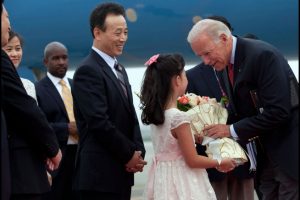In the aftermath of Joe Biden’s election, the Washington-Beijing relationship remains at the core of the world’s leading power’s foreign strategy, presenting a test of the new administration’s ability to impose a new style without diminishing its ability to obtain results. The temptation of a “reset” in relations with China – which could first manifest itself in a more conciliatory attitude and the abandonment of martial attacks against the “Chinese virus” – is present despite the fact that bipartisan convergence on this vital subject is a reality. However, this temptation comes up against the ambitions of the Chinese regime itself, and its constant provocations, exacerbated by the COVID-19 crisis. When it comes to these provocations, driven by the Chinese Communist Party and its leader’s internal calculations on legitimacy, the United States has little control, apart from the fear that the unpredictability of Donald Trump had created.
The resumption of dialogue between the two world’s largest economies would indeed satisfy Beijing, which has always favored prolonged dialogues. Talks on subjects as consensual as climate change or world peace have the merit of achieving the appearance of agreement, reinforcing China’s image as a global power and the international stature of its leaders. With the United States, as early as 2013, President Xi Jinping put forward the concept of a “new type of relationship between great powers,” which was unwisely taken up by Susan Rice, President Barack Obama’s national security advisor.
But to accept this renewed dialogue, Beijing expects convincing gestures. For the Chinese leaders, a “win-win” bilateral relationship can only be restored by reexamining such essential issues as the trade war and the ban on technology transfers, as well as an end to pressure on the fundamentals of the regime such as the legal system, intellectual property rights, and cybersecurity.
Support for multilateralism as a common denominator is another key element of Beijing’s discourse toward the new administration. But this multilateralism “with Chinese characteristics” remains essentially a tool at the service of a Chinese power that wants to be recognized as the unique pole in Asia and the sole legitimate representative of emerging countries. This is what China calls the democratization of international relations.
The return of the United States – its largest contributor – to the World Health Organization (WHO) is cited as an example of possible U.S.-China convergence based on better respect for multilateralism. But few have noted that, despite all the promises of reform, the WHO accepted that only China’s own inspectors would be in charge of the investigation into the origins of the pandemic carried out on Chinese territory.
For Xi, international relations are based on a brutal assessment of the balance of power. In this sense, Donald Trump was certainly more effective than those advocating the positive and more courteous virtues of engagement. Some in the Democratic Party had understood the necessity of realism before Trump, with the implementation of the Obama administration’s “pivot to Asia” strategy, which aimed at balancing an increasingly assertive and destabilizing China. The fear of a major crisis had, however, partly emptied this major initiative of its practical security content and China took this opportunity to advance its position by seizing islands in the South China Sea.
Joe Biden could return to the economic dimension of the pivot by joining the Trans-Pacific Partnership, which was deserted by Trump. But this strong signal would not be enough to convince Beijing of the solidity of the new U.S. administration’s commitment in Asia. That commitment must go as far as accepting the potential risk of military confrontation in the South or East China Sea or the Taiwan Strait in order to be perceived as a true deterrent.
President Biden will also have to focus on the domestic policy issues, from COVID-19 to racial tensions to the economy, that galvanized the opposition to Trump. He will have to prove himself on all these subjects before assuming the pursuit of a strongly asserted strategy toward Beijing. The weight of the lobbyists, some hopeful about the resumption of less constrained exchanges with China, will also be very powerful.
Finally, Japan, like the European Union, welcomed the election of Biden as a promise of normalized international relations. Indeed, the willingness to renew dialogue with Washington’s closest allies is a positive point that could strengthen the camp of democracies around the world. But the majority of European states, like Japan, remain above all waiting for the comfort of assured American protection. They are all tempted by a return to a past that would save them from any real reflection on the pressing challenges posed by security issues, particularly in Asia, and the more autonomous responses they must provide. Yet more defense efforts are a necessity for all, even without the pressure of a Donald Trump. The reorientation of U.S. priorities toward Asia, far from the European continent or even the Middle East, will remain a strong trend.
Valerie Niquet is head of the Asia Department at the Foundation for Strategic Research in Paris, France. She is also a senior research fellow at the Japan Institute for International Affairs in Tokyo.

































